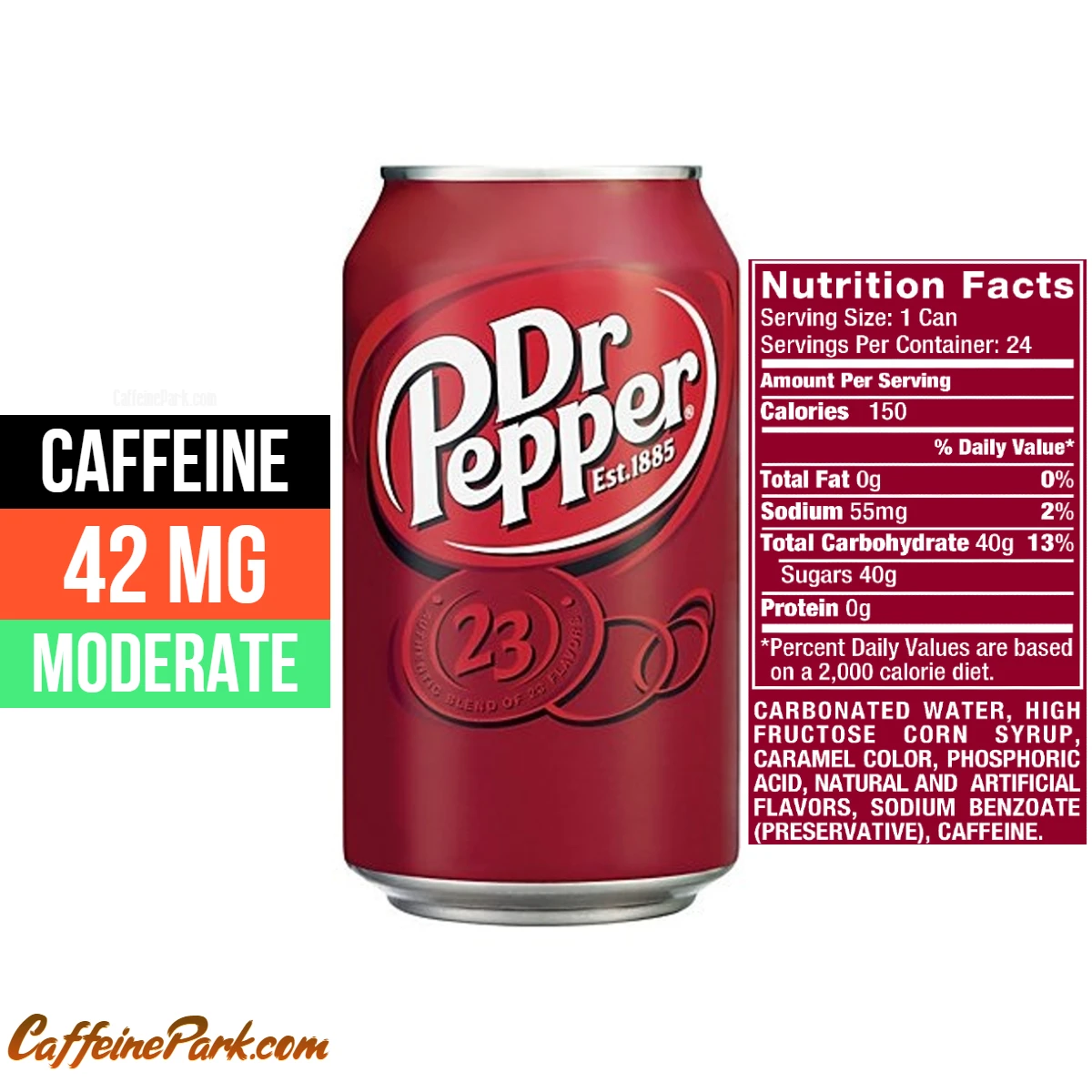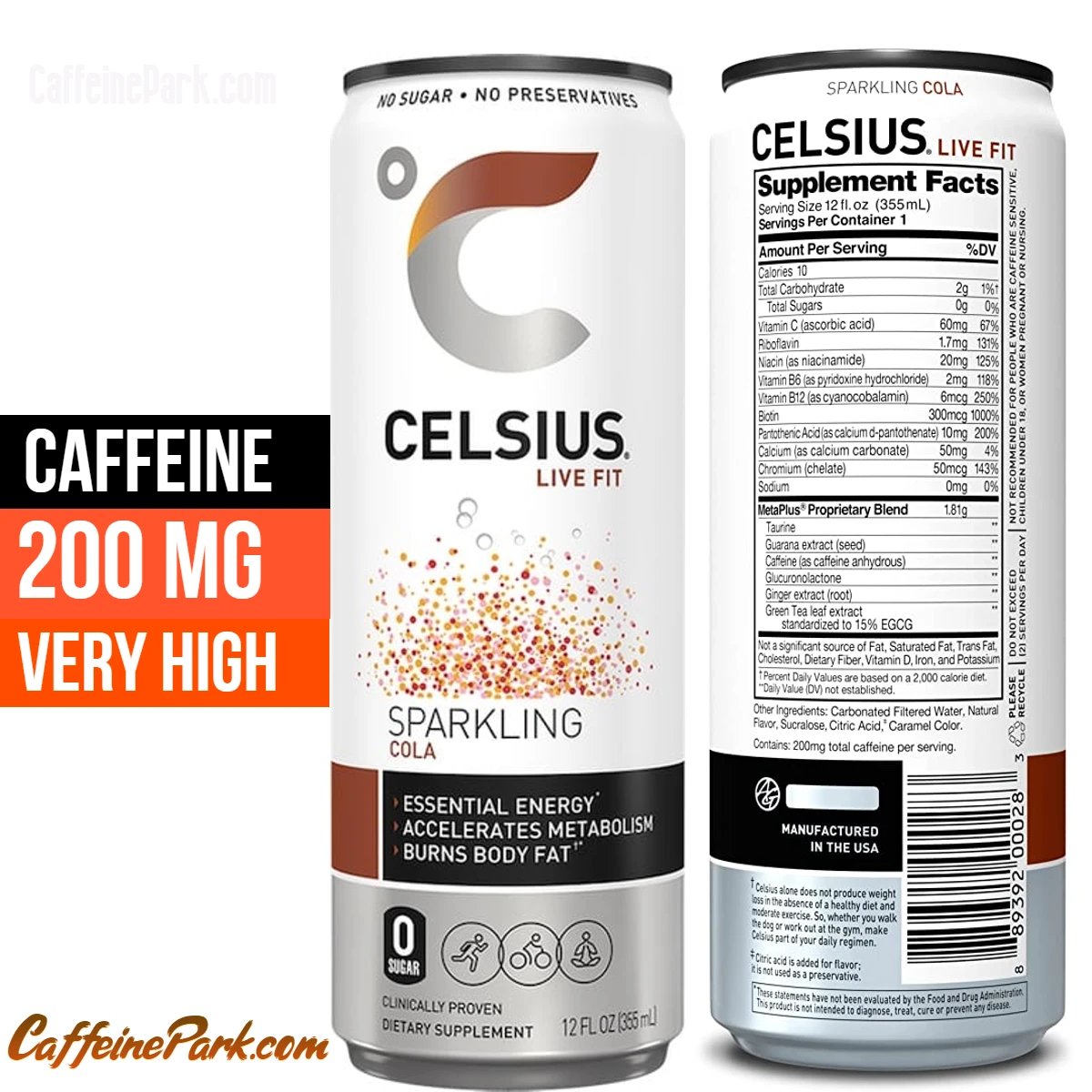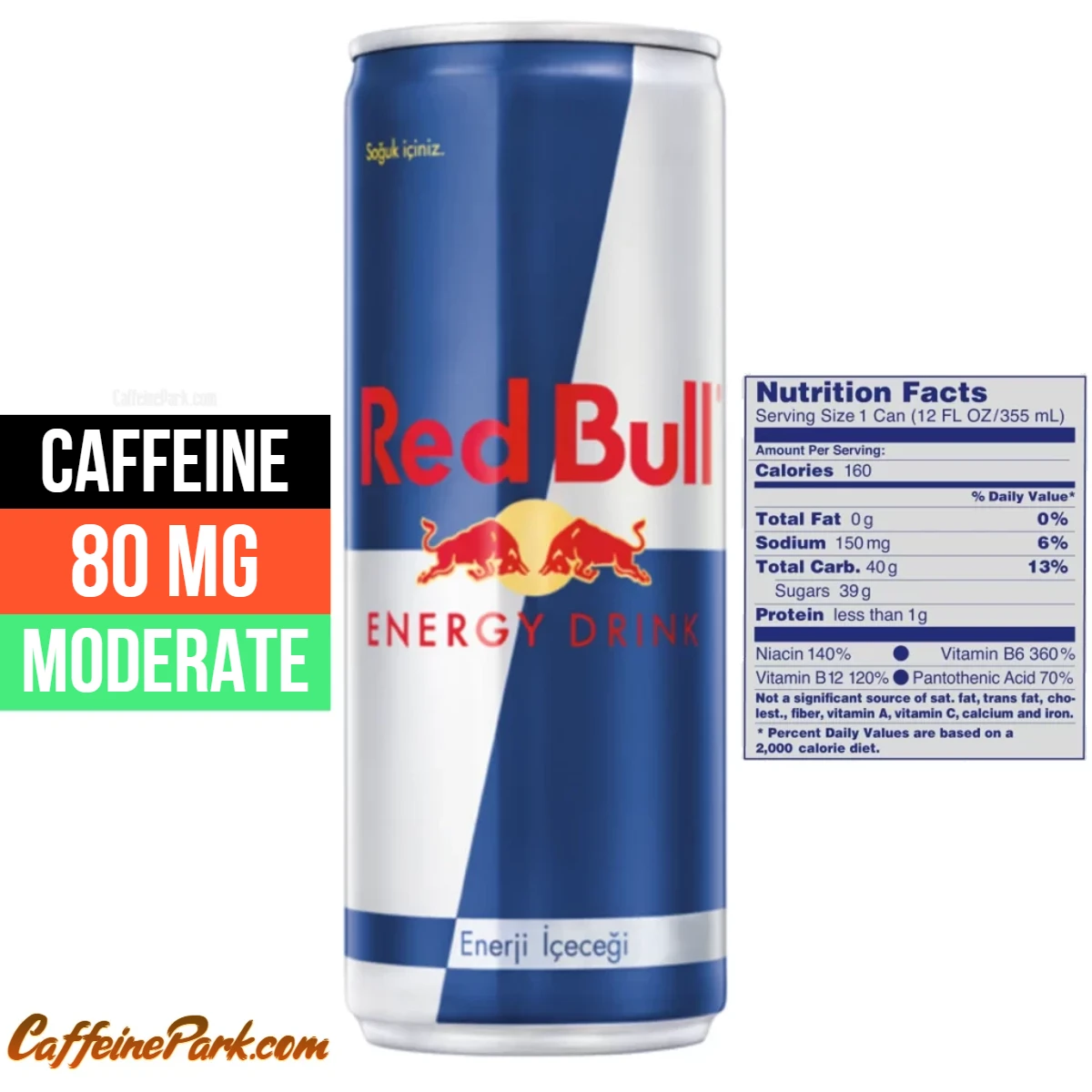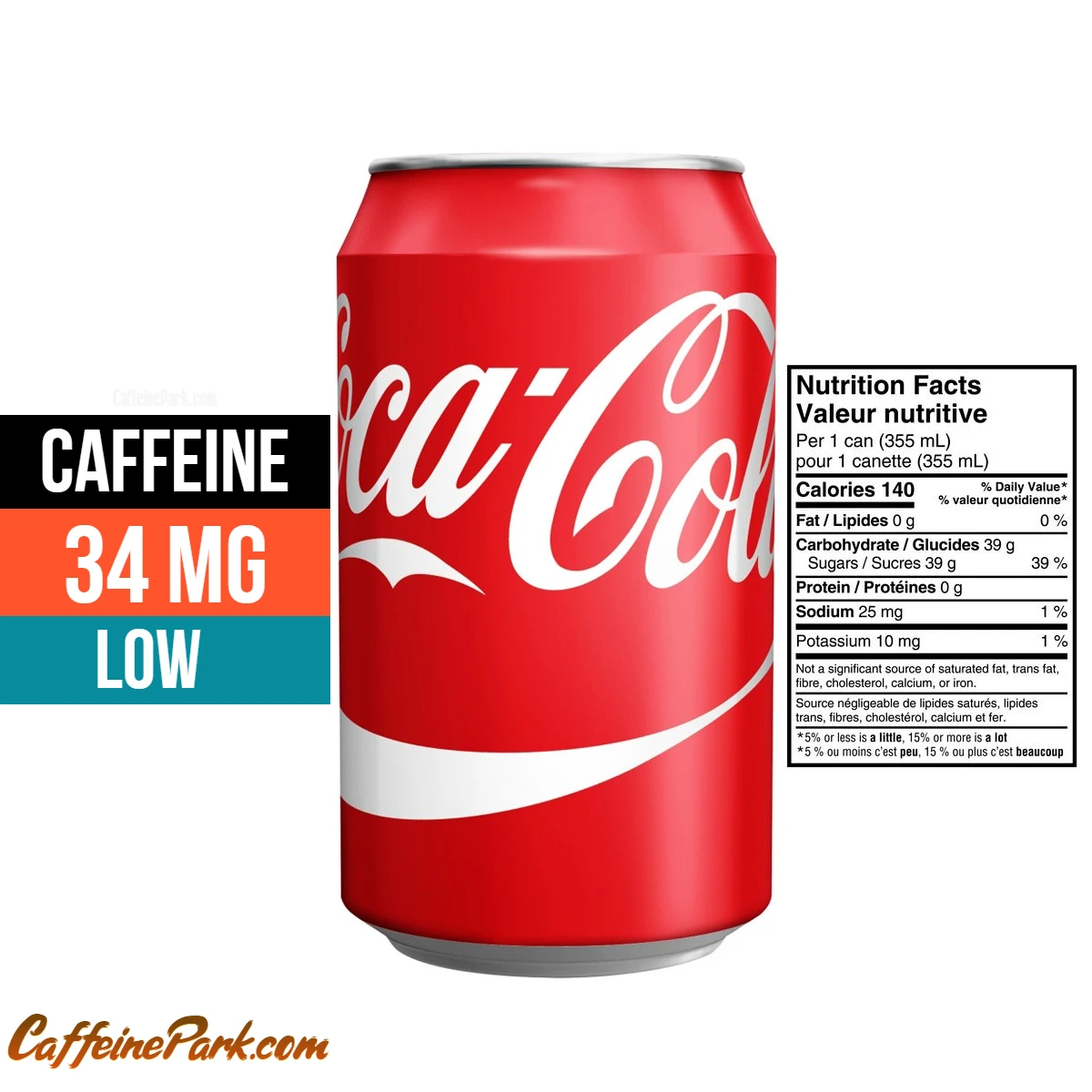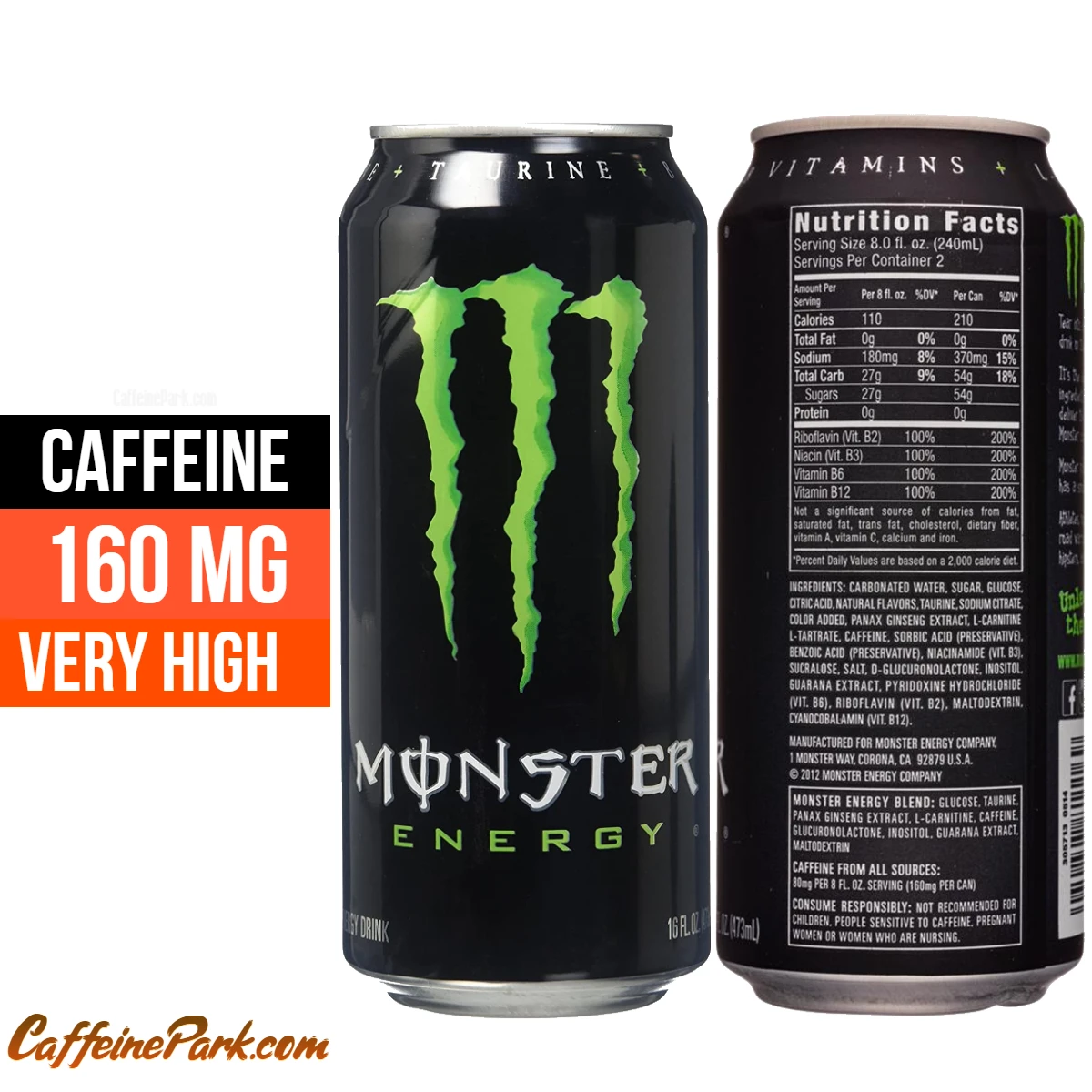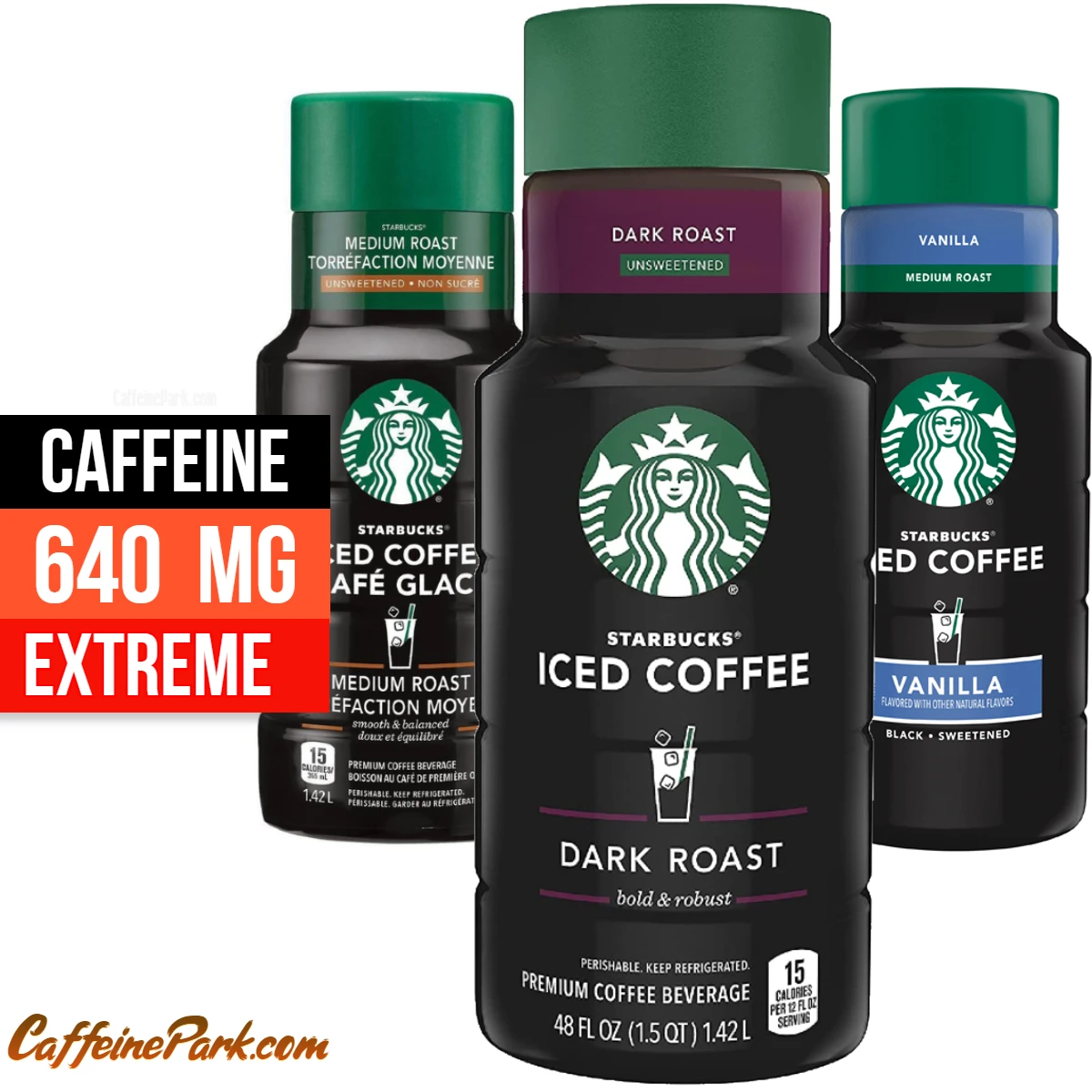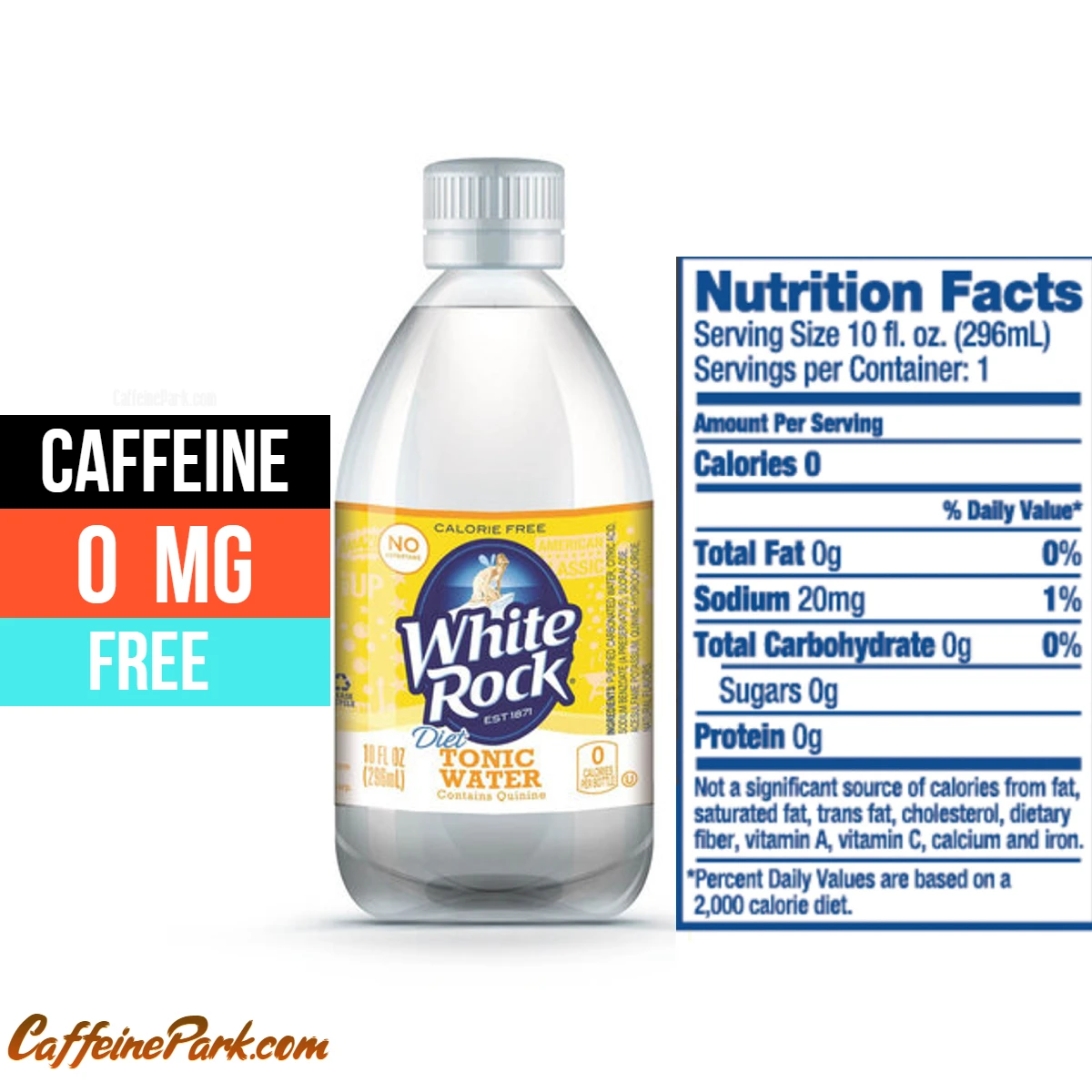
Tonic water is a carbonated soft drink that is flavored with quinine, a bitter alkaloid. It is typically consumed mixed with gin, in a drink called a gin and tonic. Tonic water can also be enjoyed on its own as a non-alcoholic beverage. The quinine in tonic water is thought to have originated as a treatment for malaria, but today it is primarily consumed for its bitter taste. Some tonic water brands also contain additional flavors such as fruit or botanicals.
All tonics Water’s are caffeine-free, the FDA allows up to 83 PPM of quinine to be added to water. Today, Tonic Water contains the exact same amount of sugar as most other flavored soft drinks.
Does Tonic Water have Caffeine?
No, Tonic Water does not contain any caffeine and caffeine-free product, which means an 11 fl oz bottle with 0 milligrams of caffeine. Compared to other drinks such as coffee or tea, Tonic Water contains less caffeine.
| Serving size | Caffeine Amount | Sugar | Caffeine strength |
|---|---|---|---|
| 100 ml | 0 mg | 9 g | CAFFEINE FREE |
| 11 fl oz bottle | 0 mg | 30 g | CAFFEINE FREE |
| 12 fl oz can | 0 mg | 32 g | CAFFEINE FREE |
- Caffeine Amount: 0 mg
- Caffeine strength: CAFFEINE FREE
- Calories: 0 kcal
- Serving size: 10 fl oz bottle
- sugar: 27 grams
Ingredients in Tonic Water
- Carbonated Water
- High Fructose Corn Syrup
- Citric Acid
- Natural And Artificial Flavors
- Quinine
Compare caffeine in Tonic Water vs. Sparkling Waters
| SPARKLING WATERS | SERVING SIZE | CAFFEINE |
|---|---|---|
| Tonic Water | 11 fl oz | 0mg |
| Arti Sparkling Water | 12 fl oz | 120mg |
| Caribou BOUsted Sparkling Water | 11.5 fl oz | 75mg |
| Phocus Sparkling Water | 11.5 fl oz | 75mg |
| Bubbl’r Sparkling Water | 12 fl oz | 69mg |
| Bubly Sparkling Water | 12 fl oz | 0mg |
| Poland Spring Sparkling Energy Water | 11.5 fl oz | 75mg |
| AHA Sparkling Water | 12 fl oz | 30mg |
| GURU Sparkling Energy Water | 12 fl oz | 100mg |
| Limitless Sparkling Water | 12 fl oz | 35mg |
| La Croix Sparkling Water | 12 fl oz | 0mg |
Review
tonic water is a carbonated soft drink that is flavored with quinine, a bitter alkaloid. It has a unique and refreshing taste, and it can be enjoyed on its own or mixed with gin to create a classic cocktail. Tonic water is a great alternative to sugary soda or energy drinks, providing a unique taste without added sugar. With the additional flavors and non-alcoholic options, it can appeal to a wider range of people.
History
Tonic water has its origins in the early 19th century when British colonizers in India discovered that the local population was using quinine, a bitter alkaloid derived from the cinchona tree, to prevent and treat malaria. At the time, quinine was the only effective treatment for malaria, a disease that was prevalent in the tropical regions where the British were establishing colonies.
To make quinine more palatable, the British began mixing it with sugar and water to create a tonic. This tonic water was initially used as a medicine, but it soon became a popular drink among the British colonizers. The popularity of tonic water spread to other parts of the British Empire, and it eventually made its way to Europe and the United States.
During the 1930s and 1940s, tonic water was commonly consumed mixed with gin, in a drink called a gin and tonic. This cocktail became popular among British soldiers and officers stationed in tropical regions. The gin provided a smooth and juniper-forward flavor, while the tonic water provided a refreshing and slightly bitter taste. Together, they created a perfect balance of flavors.
Today, tonic water is still a popular drink and is consumed in many parts of the world. It is enjoyed on its own as a non-alcoholic beverage or as a mixer in cocktails, especially gin and tonic. While it no longer serves as a medicine, the quinine in tonic water is still valued for its unique and slightly bitter taste.
Taste
Tonic water has a distinct and refreshing taste that is characterized by its slight sweetness and bitter undertone. The sweetness comes from the sugar that is added during the production process, while the bitter undertone comes from the quinine, which is the key flavoring ingredient in tonic water.
The taste of tonic water can vary depending on the brand and the specific ingredients used. Some tonic waters may have a stronger quinine taste, while others may have more sweetness or additional flavors such as lemon, lime, or grapefruit.
The quinine in tonic water gives it a distinct, slightly bitter taste. The bitterness is balanced by the sweetness of the sugar, creating a unique and refreshing taste. The bitterness of quinine can be intense for some people, but for others, it adds to the complexity and appeal of the drink.
Additionally, tonic water can also contain other flavors such as fruit or botanicals, which can enhance the taste and make it more appealing to a wider range of people.
Overall, the taste of tonic water is a unique combination of sweetness and bitterness that makes it a refreshing and popular drink. Whether enjoyed on its own or mixed with gin, tonic water is a classic and versatile beverage that has stood the test of time.
Flavor Profile
The flavor profile of tonic water is a unique combination of different elements, including sweetness, bitterness, and a hint of acidity.
Sweetness
The sweetness in tonic water comes from the sugar that is added during the production process. The sugar helps to balance out the bitter taste of quinine, which is the key flavoring ingredient in tonic water. The sweetness can vary depending on the brand and the specific recipe used. Some tonic waters may have more sugar, while others may have less, resulting in a sweeter or less sweet taste.
Bitterness
The bitterness in tonic water comes from quinine, an alkaloid that is derived from the bark of the cinchona tree. Quinine is known for its bitter taste and has been used for centuries as a medicine to treat malaria. The bitterness of quinine can be intense for some people, but for others, it adds to the complexity and appeal of the drink. The bitterness can vary depending on the brand and the specific recipe used. Some tonic waters may have more quinine, while others may have less, resulting in a more or less bitter taste.
Acidity
Tonic water also has a hint of acidity, which comes from the carbonation and/or the citrus flavors that may be added to the tonic water. The acidity gives the tonic water a refreshing and crisp taste.
Additional Flavors
Some tonic water brands also contain additional flavors such as lemon, lime, or grapefruit. These flavors can enhance the taste of the tonic water and make it more appealing to a wider range of people.
Tonic Water and Gin
Tonic water is commonly consumed mixed with gin, in a drink called a gin and tonic. The gin and tonic is a classic cocktail that has been enjoyed for decades. The gin provides a smooth and juniper-forward flavor, while the tonic water provides a refreshing and slightly bitter taste. Together, they create a perfect balance of flavors.
Ingredients and Nutrition
Tonic water is a carbonated soft drink that is made from a few key ingredients, including water, sugar, quinine, and carbon dioxide. The specific ingredients and their amounts can vary depending on the brand and the specific recipe used.
Water
Tonic water is primarily made up of water. The water is purified and treated to ensure that it is safe to drink.
Sugar
Sugar is added to tonic water to balance out the bitter taste of quinine. The amount of sugar can vary depending on the brand and the specific recipe used. Some tonic waters may have more sugar, while others may have less, resulting in a sweeter or less sweet taste.
Quinine
Quinine is an alkaloid that is derived from the bark of the cinchona tree. It is known for its bitter taste and has been used for centuries as a medicine to treat malaria. Quinine is the key flavoring ingredient in tonic water and gives it its distinct, slightly bitter taste.
Carbon Dioxide
Carbon dioxide is added to tonic water to create carbonation. It also gives the tonic water a refreshing and crisp taste.
Additional ingredients
Some tonic water brands also contain additional ingredients such as lemon, lime, or grapefruit. These ingredients can enhance the taste of the tonic water and make it more appealing to a wider range of people.
Nutritional Information
Tonic water is a non-alcoholic beverage, but it contains calories and sugar. The nutritional information can vary depending on the brand and the specific recipe used. On average, a 12-ounce serving of tonic water contains around 130 calories and 33 grams of sugar. It also contains small amounts of other nutrients like sodium and potassium.
Tonic water can be enjoyed as a refreshing alternative to sugary soda or energy drinks, but it is important to be aware of its calorie and sugar content, especially if you are watching your sugar intake. Additionally, some brands may offer sugar-free or low-calorie options, which can be a healthier alternative.
Comparison to other
Tonic water can be compared to other carbonated soft drinks and mixers in terms of its taste, ingredients, and nutritional value.
Soda
Tonic water is similar to soda in that it is a carbonated soft drink, but it has a distinct taste that sets it apart. Soda is typically sweeter and less bitter than tonic water, and it does not contain quinine. Some soda also contains artificial flavors and colors, while tonic water is made from natural ingredients.
Lemon-lime soda
Lemon-lime sodas, such as Sprite and 7up, are similar to tonic water in that they are carbonated soft drinks with a refreshing taste. But they tend to be sweeter and less bitter than tonic water, and they do not contain quinine. They also typically have more added flavors and colors.
Club soda
Club soda is similar to tonic water in that it is carbonated water with added minerals. But it does not contain quinine and it has no added flavors or sweeteners. Club soda is mostly used as a mixer, while tonic water is used as a mixer and also enjoyed on its own.
Ginger beer
Ginger beer (Ginger Ale) is a carbonated soft drink that is made from ginger, sugar, and carbonated water. It has a distinct ginger flavor and a spicy kick, and it is used as a mixer for various cocktails, including the Moscow Mule. It does not contain quinine, and it is sweeter and less bitter than tonic water.
Overall, tonic water has a distinct and refreshing taste that sets it apart from other carbonated soft drinks and mixers. Its unique combination of sweetness, bitterness, and quinine makes it a versatile mixer for cocktails and also a beverage that can be enjoyed on its own.
Customer Reviews
Tonic water is a popular and versatile beverage that is enjoyed by many people. The reviews for tonic water can vary depending on the brand and the specific recipe used.
Many customers enjoy the unique taste of tonic water, praising its balance of sweetness and bitterness. They appreciate the refreshing and crisp taste of tonic water, and they find it to be a great alternative to sugary soda. Some customers specifically mention that they enjoy the quinine bitterness which they find to be well balanced with the sweetness of sugar.
Others appreciate the additional flavors that some tonic water brands offer, such as lemon, lime, or grapefruit. These flavors can enhance the taste of the tonic water and make it more appealing to a wider range of people.
Some customers have also mentioned that they enjoy tonic water as a mixer for cocktails, specifically gin, and tonic. They find that the tonic water provides a perfect balance of flavors when mixed with gin.
On the other hand, some customers may find the bitterness of quinine to be too strong or may not like the sweetness of the tonic water. Some customers also mentioned that they prefer other mixers like soda or ginger beer for their cocktails.
As a general note, it’s important to keep in mind that everyone’s taste preferences are different, and what one person may find appealing, another may not. Therefore, it’s always a good idea to try different brands of tonic water to find the one that best suits your taste buds.
Health Benefits of Tonic Water
Tonic water is primarily consumed for its taste and as a mixer for cocktails. While it does contain some small amounts of nutrients such as sodium and potassium, it is not considered a significant source of nutrition. There are also some health concerns regarding the sugar content in tonic water.
Quinine, the key flavoring ingredient in tonic water, has been traditionally used as a medicine to treat malaria. However, consuming large amounts of quinine can be harmful and has been linked to several health issues such as muscle weakness, vision problems, and hearing loss. Therefore, it is recommended to consume tonic water in moderation and to consult with your doctor if you are taking any medications or have health concerns.
It is also worth noting that the FDA has warned against consuming tonic water as a treatment for muscle cramps caused by medical conditions such as lupus or diabetes, as it may cause serious side effects.
In summary, tonic water is primarily consumed for its taste, and as a mixer for cocktails, it does not have significant health benefits, also consuming large amounts of quinine can be harmful and should be consumed in moderation. It is always recommended to check with a healthcare professional if you are considering consuming tonic water for any health-related issues.
Side Effects of Tonic Water
Tonic water is generally safe for consumption, but it’s important to be aware of potential side effects that can occur in certain circumstances. Here are some side effects associated with tonic water:
- Quinine Sensitivity: Tonic water contains quinine, which can cause adverse reactions in some individuals. Quinine sensitivity can lead to symptoms such as allergic reactions, hives, rash, itching, and swelling. People with a known sensitivity to quinine should avoid consuming tonic water.
- Gastrointestinal Disturbances: Excessive consumption of tonic water, particularly those with high quinine content, may cause gastrointestinal issues such as stomach cramps, nausea, vomiting, diarrhea, or abdominal pain. It is recommended to consume tonic water in moderation to minimize the risk of these side effects.
- Interaction with Medications: Quinine, the main ingredient in tonic water, can interact with certain medications. Individuals taking medications like blood thinners, anticoagulants, or certain antibiotics should exercise caution or consult their healthcare provider before consuming tonic water, as it may interfere with the effectiveness of these medications.
- High Caloric Content: Some tonic water brands may contain added sugars or sweeteners, resulting in increased calorie intake. Regular consumption of tonic water with added sugars can contribute to weight gain and other health issues associated with excessive sugar intake.
- Carbonation Effects: Tonic water is carbonated, and excessive consumption can lead to bloating, gas, or discomfort in individuals who are sensitive to carbonated beverages.
It’s important to note that these side effects are generally rare and occur primarily in individuals with specific sensitivities or those consuming large quantities of tonic water. If you experience any adverse reactions after consuming tonic water, it is recommended to discontinue use and consult a healthcare professional for guidance.
Pros and Cons
Tonic water is a carbonated soft drink that is flavored with quinine, a bitter alkaloid. It is typically consumed mixed with gin, in a drink called a gin and tonic, but also can be enjoyed on its own as a non-alcoholic beverage. Here are some of the pros and cons of tonic water:
Pros
- Unique and refreshing taste: Tonic water has a distinct and refreshing taste that is characterized by its slight sweetness and bitter undertone. The sweetness comes from the sugar that is added during the production process, while the bitter undertone comes from the quinine.
- Versatile mixer: Tonic water is a popular mixer for cocktails, particularly gin and tonic. It provides a perfect balance of flavors when mixed with gin.
- Non-alcoholic option: Tonic water can also be enjoyed on its own as a non-alcoholic beverage. It can be a great alternative to sugary soda or energy drinks, as it provides a unique taste without added sugar.
- Additional flavors: Some tonic water brands also contain additional flavors such as lemon, lime, or grapefruit. These flavors can enhance the taste of the tonic water and make it more appealing to a wider range of people.
Cons
- Bitter taste: The quinine in tonic water gives it a distinct, slightly bitter taste. This can be intense for some people, and they may not like the taste of tonic water.
- High in sugar: Tonic water contains sugar, and consuming high amounts of it can be harmful to health. It is important to be aware of the calorie and sugar content of tonic water, especially if you are watching your sugar intake.
- Health concerns: Consuming large amounts of quinine, the key flavoring ingredient in tonic water, can be harmful and has been linked to several health issues such as muscle weakness, vision problems, and hearing loss.
- Availability: Tonic water may not be as widely available as other carbonated soft drinks, depending on the region.
In conclusion, tonic water is a unique and refreshing beverage that can be enjoyed on its own or mixed with gin to create a classic cocktail. Its unique taste and versatility make it a popular drink. However, it is important to be aware of its calorie and sugar content, as well as the potential health concerns related to quinine. It’s always a good idea to consult with a healthcare professional if you have any concerns.
Alternative to Tonic Water
Looking for an alternative to tonic water? Don’t worry, there are plenty of options available to suit your taste preferences. Here are a few alternatives that can add a refreshing twist to your beverages:
- Sparkling Water: If you enjoy the fizzy sensation of tonic water but want to skip the bitterness, sparkling water is an excellent choice. It comes in various flavors like lime, lemon, or mixed berry, adding a burst of natural fruit essence to your drink. Sparkling water is also calorie-free and a great option for those who prefer a lighter and more neutral taste.
- Club Soda: Club soda is another fantastic substitute for tonic water. It has a similar carbonated nature but lacks a distinctive quinine flavor. Club soda works well as a mixer for cocktails, providing a bubbly base without altering the taste profile of your drink. It’s a versatile option that pairs nicely with a wide range of spirits.
- Bitter Lemon: If you enjoy the bitterness of tonic water and want to explore a different flavor, try bitter lemon. It is a carbonated beverage that combines the tartness of lemon with a slightly bitter undertone. Bitter lemon can be enjoyed on its own or used as a mixer for various cocktails, offering a unique and refreshing twist.
- Herbal Infusions: For a more botanical twist, consider using herbal infusions as an alternative to tonic water. Experiment with flavors like lavender, rosemary, or chamomile to add depth and complexity to your drinks. Infusing your own herbs into sparkling or still water allows you to customize the flavor profile and create a truly unique beverage experience.
FAQs
There is a common misconception that tonic water contains caffeine, but the truth is that tonic water is caffeine-free. A standard 11 fl oz bottle of tonic water typically has 0 milligrams of caffeine.
No, tonic water has significantly less caffeine compared to coffee or tea. An 8-ounce serving of coffee typically contains between 95 to 200 milligrams of caffeine, while the caffeine content in tonic water is much lower.
Yes, tonic water is generally considered caffeine-free. The caffeine content in tonic water is negligible, and it can be considered a caffeine-free option.
While tonic water itself is caffeine-free, certain flavored variants may contain trace amounts of caffeine if the added flavorings have caffeine. It’s advisable to check the ingredient list or choose plain tonic water if you want to avoid any caffeine content.
Yes, tonic water is safe for individuals sensitive to caffeine. The caffeine content in tonic water is minimal and unlikely to cause any adverse effects for those who are sensitive to caffeine.
Absolutely! Tonic water can be enjoyed without any significant concerns about the caffeine content. It’s a refreshing choice for mixing cocktails or as a standalone beverage, providing a unique taste profile without the stimulating effects of caffeine.
What is tonic water?
Tonic water is a carbonated soft drink that is flavored with quinine, a bitter alkaloid. It is typically consumed mixed with gin, in a drink called a gin and tonic, but it can also be enjoyed on its own as a non-alcoholic beverage.
What does tonic water taste like?
Tonic water has a distinct and refreshing taste that is characterized by its slight sweetness and bitter undertone. The sweetness comes from the sugar that is added during the production process, while the bitter undertone comes from the quinine.
Can I drink tonic water on its own?
Yes, tonic water can be enjoyed on its own as a non-alcoholic beverage. It can be a great alternative to sugary soda or energy drinks, as it provides a unique taste without added sugar.
Can tonic water be used as a mixer for other drinks?
Yes, tonic water is a popular mixer for cocktails, particularly gin and tonic. It provides a perfect balance of flavors when mixed with gin.
Is tonic water healthy?
Tonic water is primarily consumed for its taste and as a mixer for cocktails. While it does contain some small amounts of nutrients such as sodium and potassium, it is not considered a significant source of nutrition. There are
Is tonic water caffeinated?
Tonic water doesn’t contain any caffeine. Carbonated water contains seltzer water, club soda and sparkling water. Tonix water is usually taken internally as a health drink or a cough medicine.
Is it OK to drink tonic water every day?
Quinine is an ingredient used in tonic water. Three glasses per day should be safe for most people. However, some people may experience problems if they take too much quinine. These problems include digestive upset, headache and ringing in the ears. People who are allergic to quinine might also get a rash or other symptoms.
Who should not drink tonic water?
People who shouldn’t take quinine include those with low blood sugar, abnormal heartbeat, kidney disease or liver disease. Pregnant women should avoid taking the drug as well.
What does quinine do to the body?
Quinine kills parasites in the body. It prevents them from growing. This drug is used to treat malaria. Malaria is an illness caused by a parasite called plasmodium. People get this disease when infected mosquitoes bite them. Quinine is used to kill the parasite inside the body.
Read More:
